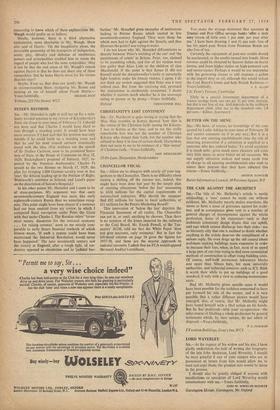SIR,—Allow me to disagree with nearly all your sug- gestions
to the Chancellor. There is no difficulty about cutting a shilling off the income tax; indeed, this might have been done last year by the simple plan of omitting allocations 'below the line' amounting to £634 millions 'for the capital requirements of nationalised industries. Why should the taxpayer find £92 millions for loans to local authorities, or £11 millions for the Potato Marketing Board? '
This innovation of 'below the line' deprives the Financial Statement of all reality. The Chancellor can put in, or omit, anything he chooses. Thus there is no mention of the losses incurred by the railways or the Coal Board. Mr. Enoch Powell, at the Tax- payers' AGM, told me that the White Paper 'does not give accounts, only estimates.' But in fact the left-hand column on page 24 gives the figures for 1957-58, and these are the nearest approach to national accounts. I admit that no FCA would append the usual Auditor's certificate.
You make the strange statement that accounts in Trustee and Post Office savings banks 'offer a deri- sory return of little over 1 per cent. per year after .tax.' I have been drawing 3 and 3f per cent. free of tax for, years past. Prizes from Premium Bonds are also free of tax.
Certainly the repayment of post-war credits should be accelerated, or the credits turned into bonds. More revenue could be obtained by heavier duties on heavy lorries, and from higher duties on high-powered cars and motor-cycles. Perhaps it would be too unpopular with the governing classes to add sixpence a gallon to the import duty on oil, although this would reduce the Coal Board's losses and help British Railways.—
Yours faithfully, J. E. Al LEN 2 St. Peter's Terrace, Cambridge
[Only in a special investment department of a trustee savings bank can one get 3f per, cent. interest, but this is not free of tax. And deposits in the ordinary department yield, after tax at the standard rate, 1.4 per cent.—Editor, Spectator.]


































 Previous page
Previous page